What is an information telecommunication network. Information and telecommunications network - what is it? The concept, types and use of information and telecommunication networks. Large companies supplying and maintaining telecommunication systems in the Russian Federation
Decree of the Government of the Russian Federation of July 31, 2014 N 746
"On the Approval of the Rules for Notifying Organizers of the Dissemination of Information on the Internet Information and Telecommunication Network of the Federal Service for Supervision of Communications, Information Technology and Mass Communications on the commencement of activities to ensure the functioning of information systems and (or) programs for electronic computers designed and (or) used for receiving, transmitting, delivering and (or) processing electronic messages of users of the Internet information and telecommunication network, as well as maintaining the register of these organizers"
In accordance with Part 2 of Article 10.1 of the Federal Law "On Information, Information Technologies and Information Protection", the Government of the Russian Federation decides:
Approve the attached Rules for notifying the organizers of the dissemination of information in the information and telecommunication network "Internet" of the Federal Service for Supervision in the Sphere of Communications, Information Technologies and Mass Communications about the start of activities to ensure the functioning of information systems and (or) programs for electronic computers designed and ( or) used for receiving, transmitting, delivering and (or) processing electronic messages of users of the information and telecommunications network "Internet", as well as maintaining the register of these organizers.
Rules
notification by the organizers of the dissemination of information in the information and telecommunications network "Internet" of the Federal Service for Supervision in the Sphere of Communications, Information Technologies and Mass Communications on the commencement of activities to ensure the functioning of information systems and (or) programs for electronic computers designed and (or) used for receiving, transmitting, delivering and (or) processing electronic messages of users of the Internet information and telecommunication network, as well as maintaining a register of these organizers
(approved by Decree of the Government of the Russian Federation of July 31, 2014 N 746)
I. General provisions
1. These Rules establish the procedure for the submission by persons operating in the information and telecommunication network "Internet" (hereinafter referred to as the "Internet") to ensure the functioning of information systems and (or) programs for electronic computers designed and (or) used for receiving , transmission, delivery and (or) processing of electronic messages by Internet users (hereinafter, respectively - the information resource, the organizer of the dissemination of information), to the Federal Service for Supervision of Communications, Information Technology and Mass Communications of notifications of the start of the specified activity (hereinafter - notification), as well as the procedure for accounting for the organizers of the dissemination of information.
2. The notification shall be submitted within 5 working days from the date of receipt by the information dissemination organizer of the requirement of the Federal Service for Supervision in the Sphere of Communications, Information Technologies and Mass Media to submit the notification.
The requirement to submit a notification is formed by the Federal Service for Supervision in the Sphere of Communications, Information Technologies and Mass Media in electronic form within 3 business days from the date of receipt of an appeal from the federal executive body engaged in operational-search activities or ensuring the security of the Russian Federation.
3. Notification may be submitted by the information dissemination organizer on its own initiative.
4. If the appeal of the federal executive body carrying out operational-search activities or ensuring the security of the Russian Federation does not contain all the information necessary to form a requirement to provide a notification, the Federal Service for Supervision in the Sphere of Communications, Information Technologies and Mass Media in within one working day, sends a request to the specified federal executive body to provide the missing information.
5. The notification shall be submitted by the organizer of the dissemination of information to the Federal Service for Supervision of Communications, Information Technology and Mass Communications in electronic form by filling out the appropriate electronic form on the official website on the Internet www.97-fz.rkn.gov.ru (hereinafter - official site).
6. The Federal Service for Supervision in the Sphere of Communications, Information Technology and Mass Media establishes forms for receiving notifications in electronic form and places them on the official website.
II. Procedure for submitting a notification
7. The notification by the information dissemination organizer shall include the following information:
a) about the organizer of information dissemination:
for citizens of the Russian Federation - last name, first name, patronymic (if any), insurance number of an individual personal account, address of registration at the place of residence (stay) or address of the place of actual residence;
for Russian legal entities - full and abbreviated (if any) name, legal form, location address, taxpayer identification number, main state registration number, last name, first name, patronymic (if any) of the head of the legal entity, other contact person of the organization;
for individual entrepreneurs - last name, first name, patronymic (if any), address of registration at the place of residence (stay), taxpayer identification number, main state registration number of the entry on state registration as an individual entrepreneur;
for foreign organizations - full and abbreviated (if any) name, country of registration, tax identifier and (or) identifier in the trade register of the country of registration, location address;
for foreign citizens and stateless persons - last name, first name, patronymic (if any), type, number and country of issue of an identity document, address of registration at the place of residence (stay) (if any);
b) postal address (if any) of the information dissemination organizer;
c) the electronic address of the information dissemination organizer;
d) domain name of the information resource;
e) email address of the administrator of the information resource;
f) email address of the hosting provider;
g) description of the service (product), the service provided.
8. The obligation to send a notification in electronic form is considered fulfilled if the appropriate form is filled out on the official website and the filling identifier is received.
9. The Federal Service for Supervision in the Sphere of Communications, Information Technologies and Mass Communications is obliged to send to the organizer of the dissemination of information a confirmation of receipt of the notice to the e-mail address indicated in the notice on the day of registration of the notice.
10. The organizer of the dissemination of information is obliged to inform the Federal Service for Supervision in the Sphere of Communications, Information Technologies and Mass Communications about changes in the information specified in the notification and about the termination of activities to ensure the functioning of the information resource no later than 10 days from the date of the relevant changes.
11. If the Federal Service for Supervision in the Sphere of Communications, Information Technologies and Mass Media receives information about the termination of the activities of a Russian legal entity or a foreign organization - the organizer of the dissemination of information or about the death of an individual entrepreneur, a citizen of the Russian Federation, a foreign citizen or a stateless person - the organizer dissemination of information The Federal Service for Supervision in the Sphere of Communications, Information Technologies and Mass Communications makes an appropriate entry in the register of organizers of the dissemination of information.
12. In the event of the transfer of rights to an information resource to another person, the organizer of the dissemination of information notifies the Federal Service for Supervision in the Sphere of Communications, Information Technologies and Mass Media about this.
13. The information specified in paragraphs 10 - 12 of these Rules is sent to the Federal Service for Supervision of Communications, Information Technology and Mass Media by filling out a form for receiving notification of changes in initial information in electronic form on the official website.
14. Access to the forms for receiving notifications posted on the official website is carried out after the organizer of the dissemination of information has passed identification and authentication using the federal state information system "Unified Identification and Authentication System in the infrastructure that provides information technology interaction of information systems used to provide state and municipal services in electronic form", created in accordance with the Decree of the Government of the Russian Federation of November 28, 2011 N 977 "On the federal state information system "Unified identification and authentication system in the infrastructure that provides information and technological interaction of information systems used to provide state and municipal services in electronic form".
c) information related to the organization of interaction between the Federal Service for Supervision of Communications, Information Technologies and Mass Media with the organizer of the dissemination of information;
18. Activities to ensure the maintenance of the register of information dissemination organizers are carried out by the Federal Service for Supervision in the Sphere of Communications, Information Technologies and Mass Communications, taking into account the provisions of the Federal Law "On the contract system in the field of procurement of goods, works, services to meet state and municipal needs".
19. The information contained in the register of information dissemination organizers is open and public, with the exception of personal data, which is protected by the legislation of the Russian Federation on personal data.
The Federal Service for Supervision in the Sphere of Communications, Information Technologies and Mass Communications places the information contained in the register of information dissemination organizers on the official website within 3 working days from the date of making the registry entry in the register of information dissemination organizers.
20. The Federal Service for Supervision in the Sphere of Communications, Information Technology and Mass Communications, upon a reasoned request from interested state bodies, taking into account the requirements of the legislation of the Russian Federation on personal data, within 5 working days from the date of registration of the corresponding request, shall provide in the form of extracts the information specified in clause 7 of these Rules, contained in the register of information dissemination organizers, or informs about the absence of the specified information in the register of information dissemination organizers.
From the point of view of informatics, a computer network as a prototype of an information and telecommunications network is a single complex, including a geographically distributed system of computers and their terminals, combined into a single system by means of communication using switching equipment, software and protocols for transmitting (receiving) information, as well as solving information, management, computing and/or other tasks (21, 464).
In the above definition, the following features of a computer network can be distinguished.
1. The functional purpose of any computer network is associated with sending and receiving information.
2.The network is computing system(terminals), with the help of which information is processed and prepared for transmission to the user.
3. The transmission of messages and information (information) is provided switching equipment, software and technological protocols(a set of rules governing the format and procedures for the exchange of information between users).
Each of the selected features characterizes one of the important aspects of the computer network.
Gradually, the information, technical, technological and switching properties of the network evolved into a more compact name and transformed it into the concept of "information and telecommunications network".
The highlighted features and characteristics were used by the legislator when formulating the definition of the concept contained in Article 2 of the Law “On Information”, according to which information and telecommunications network is defined as a technological system designed to transmit information over communication lines, access to which is carried out using computer technology.
The first sign of the concept under consideration is high tech property information and telecommunication network. The legislator singled out the technological nature of the network and at the same time emphasized that this system consists of the elements included in its composition: computing and software tools, technical telephone communication channels and a subsystem for accessing them (switching equipment).
Therefore, the composition of the information and telecommunications network must necessarily include three elements:
computer technology, i.e. computers;
telephone communication channels;
· system of access to communication channels (switching equipment and regulations for their use).
The access system is determined by the relevant conditions (possibility) of obtaining information or getting acquainted with it. Such conditions are determined by the access mode or a set of conditions organizational, legal and technical character. Their composition may include, in relation to the specific conditions of the functioning of the information and telecommunications network, various rules and actions aimed at the possibility of familiarization, transmission and receipt of information, incl. actions on the use of technical means. Such rules and actions can, on the contrary, be aimed at protecting information on the network, i.e. obstruction of access or receipt of information. In other words, access is always a combination of software and hardware, switching equipment, as well as rules and actions (measures) that determine the capabilities of a network user, i.e. legally established composition, which has important legal significance.
Orders of the Ministry of Information Technologies and Communications of the Russian Federation establish rules for the use of communication facilities used to provide access to information and telecommunication networks.
For example, the order of the Ministry of Information Technologies and Communications of the Russian Federation of December 11, 2006 No. 166 approved the Rules for the use of communication tools used to provide access to information on information and telecommunication networks, transmission of messages by e-mail and facsimile messages, which contain requirements for communication tools used to provide access to information of information and telecommunication networks, transmission of messages by e-mail and facsimile messages (215).
These rules define the concept "means of communication"- hardware and software, including any of the listed hardware (TS) or their combination (two or more):
1. TS for electronic messaging, incl. e-mail, transmission of voice information by e-mail, short text messages, multimedia messages;
2. Information TS in terms of domain names, access to information resources, management;
3. TS remote access;
4. TS authentication and identification;
5. TS transmission of fax messages.
The above means of communication are subject to mandatory declaration (certification) of compliance with standard requirements. At the same time, the corresponding requirements for each of the above technical means are established.
Separate regulatory legal acts of the President of the Russian Federation or the Government of the Russian Federation establish the specifics of connecting state information systems to information and telecommunication networks.
For example, Decree of the Government of the Russian Federation of May 18, 2009 No. 424 "On the specifics of connecting federal state information systems to information and telecommunication networks" (216) or Decree of the President of the Russian Federation of March 17, 2008 No. 351 "On measures to ensure the information security of the Russian Federation when using information and telecommunication networks of international information exchange” (217).
Information and telecommunication networks can be:
local(one building of any organization);
departmental, covering users of one department or corporation;
regional, uniting users of cities, regions and other territorial units);
special purpose(for example, a secure network of the state automated system GAS "Pravosudie", the state automated system GAS "Vybory", etc.);
global(Internet).
Questions to control:
1. Structure of the information system
2. Concept and types of information and telecommunications network
3. Providing access to the information and telecommunications network
The development of the telecommunications system in Russia leads to the active use of new information exchange technologies. Due to this, the citizens of our country can receive the information they need from any sources in a timely manner.
Features of Russian information and telecommunication systems
The main feature of modern telecommunication systems in our country is their integration with tracking and security systems operating at the state level.
Most telecommunications systems that transmit personal information are subject to the laws of protecting the state interests of the Russian Federation.
Telecommunications companies provide data stored on servers at the request of law enforcement officials.
From a technical point of view, Russian telecommunications networks are integrated channels for transmitting information.
For example, most ISPs provide their customers with the following services:
- Internet access;
- digital television;
- telephony.
A company using an integrated communication channel seeks to attract customers to maximize the use of available capacity.
Unified State Information and Telecommunication System
The need of law enforcement agencies for the rapid exchange of confidential information led to the need to create a specialized telecommunications system.
The unified state information and telecommunication system - EITKS ATS consists of regional divisions connected to each other using owned or leased communication channels. Each typical system consists of several basic elements.
The design is based on a local area network connected to an office telephone or mini-PBX. This ensures fast data transfer on a local scale (for example, within the same building).
The service equipment of the telecommunications system is a standard component for data transmission:
- routers;
- concentrators;
- routers;
- broadband cables;
- radio access points.
The performance of the entire system is ensured by:
- engineering components;
- direct connection with a communication service provider;
- equipment for multiplexing - signal distribution between other participants in the circuit.
The integrated regional subdivisions of the general telecommunication system ensure the prompt exchange of information between the users of state administration apparatuses, federal news agencies, and also electronic catalogs of thematic information.
The supervisory and controlling body of the state telecommunications system is the Ministry of Internal Affairs of the Russian Federation.
Development of telecommunication systems
The main goal of the development of telecommunication systems at any level is to provide a stable communication channel and timely access for all participants to the information they need.
To this end, telecommunications systems are being improved in two directions:
- The hardware of the systems is represented by the latest technologies, installations and devices that carry out a quick exchange of data arrays. For example, fiber optic cables and powerful hubs allow you to get a good signal level at a great distance from the source.
- The software aspect of systems development is the introduction of secure applications for setting up and managing data transmission equipment. Modern programs in this area ensure the stable operation of equipment, the competent distribution of network capacities between users, as well as the safety of personal data.
Large companies supplying and maintaining telecommunication systems in the Russian Federation
Large companies supplying and servicing telecommunications systems in the Russian Federation include:
- InterZet is the largest provider of Internet access services in St. Petersburg, as well as digital television and related services. Customers are provided with round-the-clock technical support, company employees independently maintain production facilities;
- CSMC is a Moscow-based company engaged not only in providing Internet access, but also in the creation of turnkey equipment for local networks. Customers are offered engineering solutions tailored to their unique circumstances.
OOO Telecommunication Systems, Moscow
LLC "Telecommunication Systems" is a Moscow-based company that has been operating in the telecommunications market for 14 years, is a contractor for a large number of cellular operators and Internet providers.
The main activity is the installation of various telecommunication networks from fiber-optic to low-current. It is by the forces of this company that the infrastructure of telecommunications in the city of Moscow is being developed.
The extensive material and technical base of the company allows for engineering work, preliminary surveys and turnkey installation of telecommunication systems.
Telecommunication systems of Crimea
Modern telecommunications systems in Crimea are subject to the basic principles of Russian legislation, and companies provide customers with modern equipment and a high level of service.
Crimean Telecommunications is the most well-known provider of such services in Feodosia, providing modern technologies for fiber optic network access, telephony and satellite television.
Globus-Crimea-Telecom is a small local company specializing in the provision of telephony services and broadband Internet access.
Group of companies "Ramenskiye Telecommunications"
The Ramenskiye Telecommunications Group of Companies is a telecommunications holding that provides high-speed Internet access, data transmission in local networks, and cable broadcasting.
Telephony, cable TV and Internet access services have been provided to customers since 2003, the holding works with individuals and legal entities.
A feature of the company's technical equipment is a system for continuous monitoring of equipment to prevent communication interruptions in a timely manner.
Modern information and telecommunication systems in Russia and other countries are demonstrated at the annual Sviaz exhibition.
Read our other articles:The study of the legal essence of the Internet, the legal culture of the individual and their interaction is a necessary prerequisite for analyzing the features of the formation of the legal culture of the individual in the conditions of the formation of the information society.
The Internet as a global information space "does not recognize" state borders and is not only the most effective means of access to information resources accumulated by mankind, but also becomes a means of disseminating mass information. The functioning of the network is a powerful factor in the development and use of advanced technologies. On the other hand, the use of the Internet is associated with: the possibility of uncontrolled dissemination of harmful information, penetration into control systems, violations of human rights, which undoubtedly requires special attention to information security issues. The rapid development of the Internet in the civilized world is ahead of the process of creating and improving the regulatory legal acts necessary to regulate emerging problems. With the development of the Internet in recent years, the legal problems of the network are becoming more relevant against the backdrop of a noticeable transformation in the world of approaches to their settlement: from an emphasis on self-regulation to strict legal regulation. In our country, already at the end of 1996, as a response to the great attention of the general public, government authorities and business people to the legal problems of the Internet in Russia, parliamentary hearings were held by the State Duma committees on security and on information policy and communications. The main problems that require legislative regulation in Russia in connection with the development of the Internet, practically do not differ from those in other developed countries of the world: 1) ensuring free connection to the Internet and the exchange of information on the network; 2) legal protection of copyrights and other objects of intellectual property; 3) protection of personal data, in particular those data that are collected in the course of activities of network operators (including addresses, phone numbers and other personal data of subscribers or buyers in the "electronic commerce" system); 4) connecting state bodies to the Internet and providing citizens with information about the activities of these bodies; 5) prevention of the dissemination of offensive and obscene information, calls for inciting national, racial, religious hatred, etc.; 6) electronic document management, electronic signature, confirmation of the authenticity of information in information products, means of viewing and transmitting information; 7) e-commerce; 8) information security: computer viruses, unauthorized access to information, hacking of servers and networks, destruction and substitution of information; 9) application of means of cryptoprotection; 10) jurisdiction: the legislation of which state should be applied to regulate the actions performed on the network. An analysis of the current Russian legislation shows that the issues of legal regulation related to the functioning and development of the Internet system in Russia form an extensive regulatory framework that includes more than 50 federal laws at the federal level alone, not to mention numerous regulatory legal acts of the President and the Government of the Russian Federation. The range of these legislative acts is extremely wide, and their interpretation from the standpoint of the specifics of legal relations arising from the use of modern information technologies is difficult, especially since when developing these laws, they did not provide for appropriate opportunities. It is clear that this area of legal relations is completely new for the courts.
The Internet, being a network for transmitting information, is the habitat of the information society, organically merging with the general trends in the informatization of various aspects of public life. Most of the definitions of information have something in common. In particular, they assume the existence of at least four components:
Klimenko S., Urazmetov V. Internet: habitat of the information society. Protvino, 1995. S. 17 - 22.
1) the process of knowing something about which information is transmitted;
2) transmitting information;
3) perceiving information;
4) the information itself.
Based on the foregoing, information transmitted via the Internet is information about the world around it, its objects, processes and phenomena, presented in a form that allows decoding the encoded data (the data is in binary form and does not need to be converted, as, for example, when scanning an image or digitizing sound).
Petrovsky S.V. Legal regulation of the provision of Internet services: Dis. … cand. legal Sciences. M., 2002. S. 24.
Thus, the Internet as an information and telecommunications network is a means of transmitting information about the surrounding world, its objects, processes and phenomena, objectified in a form that allows their machine processing (decoding).
From a technical point of view, the Internet is the largest telecommunications network formed by combining more than ten thousand five hundred telecommunications networks of various types. Such unification became possible due to the use of the TCP / IP internetwork protocol, which plays the role of a kind of standards translator when transferring data between different types of telecommunication networks.
In accordance with paragraphs 3 and 4 of Art. 2 of the Law on Information, an information system is a set of information contained in databases and information technologies and technical means that ensure its processing; information and telecommunications network - a technological system designed to transmit information over communication lines, access to which is carried out using computer technology.
On the territory of the Russian Federation, the use of information and telecommunication networks is carried out in compliance with the requirements of the legislation of the Russian Federation in the field of communications, this Federal Law and other regulatory legal acts of the Russian Federation.
Regulation of the use of information and telecommunication networks, access to which is not limited to a certain circle of persons, is carried out in the Russian Federation, taking into account the generally accepted international practice of the activities of self-regulatory organizations in this area. The procedure for using other information and telecommunication networks is determined by the owners of such networks, taking into account the requirements established by this Federal Law.
The recipient of an electronic message located on the territory of the Russian Federation has the right to conduct a check to identify the sender of the electronic message, and in cases established by federal laws or by agreement of the parties, is obliged to conduct such a check.
The transfer of information through the use of information and telecommunication networks is carried out without restrictions, subject to the requirements established by federal laws for the dissemination of information and the protection of intellectual property. The transfer of information may be limited only in the manner and on the terms established by federal laws.
In the process of legal regulation of the Internet, new subjects of relations arise:
- site - a set of web pages with a repetitive design, united thematically, linked by links navigationally and physically located on a web server of a local network or the Internet at one address (domain name);
- web page - an electronic document made on the basis of the HTML hypertext markup language (HyperText Markup Language) and included as a unit of information presentation in a set of pages with mutual hyperlinks - a website on a local network or the Internet;
- domain - each computer connected to the Internet is allocated a unique identification number, called an IP address. IP stands for Internet Protocol, i.e. protocol by which computers communicate on the Internet. An IP address is a sequence of four numbers separated by dots and looks like this: 82.116.44.1. Presented in this form, the IP address is difficult for a person to remember. In this regard, for ease of remembering and perception, the Domain Name System (DNS) was created. With the help of this system, it became possible to associate each IP address with a unique symbolic name, called a domain name;
- e-mail - a kind of telecommunications carried out by means of Internet technologies.
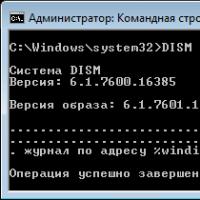 How to Fix Windows Update Installation Errors Using Built-in Component Repair
How to Fix Windows Update Installation Errors Using Built-in Component Repair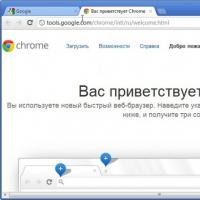 Free programs for Windows free download
Free programs for Windows free download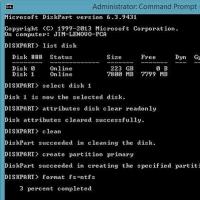 Proven ways to remove protection from the drive
Proven ways to remove protection from the drive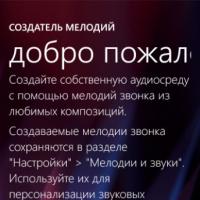 how to change windows startup ringtone how to set windows ringtone
how to change windows startup ringtone how to set windows ringtone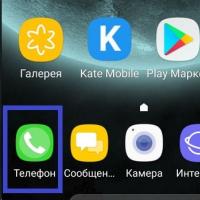 Nokia lumiya blacklist in classmates
Nokia lumiya blacklist in classmates How to get a replacement phone under warranty
How to get a replacement phone under warranty Sony Xperia Tablet S - Specifications
Sony Xperia Tablet S - Specifications